Hey ya, how's it goin'?  Long time no historypost, and that's why today I wanted to recount one of the most dramatic single events of the Early Reformation—The Siege of Munster! Prophets, princes, the cloth, and the lay come to duke it out at the End of the World smack dab in the middle of Sixteenth Century Germany! They've all gathered for one purpose, and it's to answer the question "What if we made that homeless drug addict constantly screaming 'THE END IS NIGH' on the street corner a dictator?" Well, if you're curious about the answer to that question, then keep reading!
Long time no historypost, and that's why today I wanted to recount one of the most dramatic single events of the Early Reformation—The Siege of Munster! Prophets, princes, the cloth, and the lay come to duke it out at the End of the World smack dab in the middle of Sixteenth Century Germany! They've all gathered for one purpose, and it's to answer the question "What if we made that homeless drug addict constantly screaming 'THE END IS NIGH' on the street corner a dictator?" Well, if you're curious about the answer to that question, then keep reading!
========
CONTEXT
========
The year 1517 should sound familiar to you. It's when a certain godless  nailed 95 demands on a church and ripped the religious landscape of Europe asunder (or at least it would've been if that story weren't probably apocryphal). You might recognize the bigger players of the reformation, but there exists a (comparatively) little known protestant faction who made quite a stir sometime in the 1530s in the North German city of Munster.
nailed 95 demands on a church and ripped the religious landscape of Europe asunder (or at least it would've been if that story weren't probably apocryphal). You might recognize the bigger players of the reformation, but there exists a (comparatively) little known protestant faction who made quite a stir sometime in the 1530s in the North German city of Munster.
The Anabaptists! Now, Anabaptism was a very decentralized movement. There is no one "true" Anabaptist faction, and no singular point of origin for the movement either. Although the first reformers that may be called Anabaptists were disillusioned followers of Zwingli (a Calvinist preacher). I have to stress that these "original" Anabaptists shouldn't be looked at as the forefathers of the wider movement, but merely the first independent Anabaptist group to develop chronologically (kind of)(sort of)(maybe).
Sub groups within the larger Anabaptist movement, mostly divided by which leading figures they chose to follow, agreed on the same general points:
1. Christians should come to the faith of their own free will rather than through coercion or circumstance.
2. The events in the Bible all literally happened.
(Obviously, this isn't all of Anabaptist theology, but they're the two most important points for our purposes here)
That might not seem like much now, but these ideas had very radical consequences back in the day. The first point meant that Anabaptists rejected the common practice of infant baptism, so second baptisms were common among them as they did not view the first time as legitimate (this is where the term "Anabaptist" comes from: it means "rebaptiser"). Since the other major sects and religious authorities of the time upheld infant baptism, and because second baptisms are a big no-no according to the bible, this alone branded them heretics. The free choice doctrine also meant that Anabaptists held no loyalties to any organized church, be it Protestant or Catholic. The intertwining of church and state common to this era makes this practically anarchical when viewed by both the authorities of the day and Anabaptists themselves.
Biblical literalism, when applied to the Book of Revelation, imagines an eventual apocalypse in which the second coming of Jesus Christ and establishment of His holy Kingdom on Earth is precipitated by a great struggle between all true Christians and the hordes of the godless. Revelation being a favorite portion of the Bible among many Anabaptist leaders and their followers, the "True Christians" are substituted for members of the Anabaptist sect and the "Godless" are imagined to be everyone who isn't them. Belief in being the chosen elect coupled with the assumption that Revelation's events were soon to come led to some rather rambunctious behavior. 
================
THE NEW JERUSALEM
================
Melchior Hoffmann was one such Anabaptist leader with a penchant for apocalyptic soothsaying. He roamed the cities and towns of Northern Germany, pronouncing doom to the unfaithful and imminent thousand year reign of the Lord. He prophesied a New Jerusalem where the Lord would descend from Heaven and begin His rule, and that New Jerusalem was to be Strasbourg. Not wanting to lose out on the holy action, he lead a number of his followers to settle in the city, waiting for what was surely to come.
Unfortunately for Hoffmann and company, the Strasbourg city council did not share his expectations and promptly imprisoned him along with many other Anabaptists. He would spend the rest of his life in that Strasbourg prison, preaching out his cell window at the streets below.
If you asked me, it's a little too convenient for the New Jerusalem to have been a city so near and accessible to Hoffmann and his followers, but I guess I'm not a prophet.  But you know who is? A tall, lanky Dutchman by the name of Jan Matthias, that's who! He was one of Hoffman's disciples that escaped imprisonment in Strasbourg and now he's got it into his head that he's actually Enoch, one of the two witnesses of Revelation, endowed by the Almighty with holy powers and tasked to spread His word. That may seem a little out there, but
But you know who is? A tall, lanky Dutchman by the name of Jan Matthias, that's who! He was one of Hoffman's disciples that escaped imprisonment in Strasbourg and now he's got it into his head that he's actually Enoch, one of the two witnesses of Revelation, endowed by the Almighty with holy powers and tasked to spread His word. That may seem a little out there, but  tendencies are somewhat normal for Anabaptists.
tendencies are somewhat normal for Anabaptists.
Obviously Hoffman had been wrong about Strasbourg, but that didn't mean his was wrong conceptually. The city of God must just be elsewhere! And so Matthias journeyed North Germany in search of this city, peaching to the region's residents, and picking up a certain cloth merchant by the name of Jan Van Leyden as a follower (yes, they're both named Jan). But enough about preaching prophets; let's talk about our setting.
==================
MONSTERS IN MUNSTER
==================
Sitting on the River Aa, with strong walls and a double moat protecting its residents, Early 1530s Munster provided a safe and secure shelter for manufacturers and merchants alike. One such merchant, Bernard Knipperdolling, along with his allies on the city council and in the guilds, had leveraged that defensiveness and economic power to gain quite a bit of autonomy from their feudal lord, Prince-Bishop Frederick Von Weid.
Interesting thing about Von Weid, he once kidnapped and imprisoned Knipperdolling while he was out travelling on a business trip to Lubeck. The merchant was only saved when his brothers scrounged up enough money to ransom him, but not before he was tortured for 6 months and made to swear he wouldn't be too public about his Protestant sympathies. Not how you win friends.
On the spiritual side of things, the city was one of the more tolerant. The council had both Protestant and Catholic members, and securing autonomy from the Bishop took precedent over any religious squabbles they might otherwise get into, but not everyone could put aside their sectarian concerns.
Bernard Rothmann, a University of Cologne-educated clergyman certainly couldn't (and yes, him and Knipperdolling also have the same first name). He was the preacher at the local St. Mauritz church, and a skilled one at that. He'd recently returned from meeting with various protestant leaders, including the big man Martin Luther himself, and he's got a few new ideas about the faith. He's preaching all about how infant baptisms are dumb and how Revelation is soon to come.  Where have I heard those before...?
Where have I heard those before...?
In any case, he gets back and immediately leads his congregation to ransack his own church. Paintings of Mary and other religious figures are desecrated, cowtools of worship trashed, religious works of art smashed, and literature excepting the vernacular Bible burned, the whole nine yards of iconoclasm. Not content with confining his ideas to one congregation, Rothmann walked the streets of the city, preaching openly.
Maybe, if you were the average resident of Munster, you could ignore some rando preacher yelling out in the street, but he wasn't alone. He had followers with him, breathing fire and brimstone and at the head of the crowd, next to Rothmann himself, is Bernard Knipperdolling. Councilman, successful merchant, champion of your home's independence from the tyrant wearing a Bishop's miter. If such a respected member of the community is part of this whole thing, surely that Rothmann guy must know what he's talking about. 
===============
CLEANSING FLAMES
===============
Rothmann's influence grew with his congregation. He was practically untouchable, having enjoyed the protection of Knipperdolling. Catholic churches across the city were given the same treatment as St. Mauritz, with at least one report describing a painting of the virgin Mary being smeared with feces. Witnesses claimed to have seen Anabaptists shedding their clothes, running and rolling around in the muck of the street while rambling as if possessed. Rothmann's influence secured him a place at St. Lambert's Cathedral, the city's largest church and one that was conveniently located overlooking the market plaza. He butt heads with the other clergymen there, who appealed to the Bishop to put an end to his heresy.
But things aren't how they used to be. The Bishop is old, tired of the struggle against the city's council, the Lutherans, and even his own colleagues in the church branding him a protestant sympathizer. His own influence within the city had long been eclipsed, with attempted enforcement of his rule likely to end in bloodshed. Rather than face the issue, the Bishop resigned.
His successor died within a few months so I'm not gonna talk about him! 
But HIS successor, a man by the name of Franz von Waldeck, was an aristocrat and career clergyman. A caricature of all the abuses and corruption of the church, he was given his station through his connections as nobility, rather than merit or devotedness to God. He was greedy, power hungry, and gluttonous, if his portrait is anything to go by. He was wrathful, rewarding any perceived disloyalty with a trip to the gallows, as quick to end a life as he was to stuff his face. He was also a fricking fatass. His bold approach to the recent upheaval was to hire a mercenary army to pressure the city's council and inhabitants.



While Franz gathered his army, events inside Munster's walls continued to escalate. The City Council had long been suspicious of Rothmann and his Anabaptists. They tried to force his exile from Munster, but an angry mob descended on the city hall in opposition. Portions of the city fell under the control of the Anabaptists and a standoff ensued. In defense, the council called up hundreds of rural presents, armed with farming cowtools for weapons.
Upon arrival, the council's men were met with crowds of zealots yelling "REPENT! REPENT!", claiming God's wrath shall befall them should they not flee this holy place. The (by now) entirely protestant council, still having the problem of the Bishop at their backs and who had lost the sympathies of much of the city, agreed to a peace with the Anabaptists. Brokered by Landgrave Philip of Hesse, one of the only halfway reasonable actors in this story, the peace forced the peasants to leave and the council not to evict the Anabaptists.
Upon the departure of the peasants, the sky was suddenly bathed in red, flames dancing across the clouds while three Suns appeared beside them. The Anabapists took this event as a sign from God, that they really were His chosen. Catholic historians believed it to be the Devil's work.
==========
RESTITUTION
==========
A city divided against itself couldn't stand the looming threat of the Bishop. Unfortunately for the old guard of Muster, or what was left of it, the scales had tipped against them. Throughout Rothmann's rise, he hadn't just been recruiting locals. Many Anabaptists, discontent with the persecution they faced in their homes, migrated to Munster. Fathers, mothers, and children left their families and homes to settle in this like-minded safe haven. In fact, so much of the original makeup of Munster had been displaced or assimilated by the Anabaptists that they'd built up enough political weight to force a council election. The new council was staffed entirely by Anabaptists.
As it would happen, a certain Jan van Leyden was one of these migrants. Remember him? He's the disciple-guy of Jan Matthias mentioned earlier, and he saw opportunity in recent events. Matthias was still searching for his holy city and the supposed miracle that vanquished the peasant army seemed sufficiently holy to justify giving Munster that title (notwithstanding the friendly government and supportive populace). Van Leyden sent word to Matthias.
Matthias' arrival made waves immediately. He'd already been a popular figure among Anabaptists, but seeing him in person was an entire world apart from mere news of a roaming prophet. He was tall, skinny, wrapped in black hooded robes with a forked beard nearly reaching his waist. Heading processions with a burning gaze and fiery words, preaching of the Kingdom soon to be grown from the nourishing blood of felled heathens, it wouldn't be a far stretch to believe this man truly had witnessed Revelation.
The prophet intended to make good on his promise for heathen blood. His rhetoric was aggressive, more aggressive than even Rothmann, not shying from making targets of the remaining non-Anabaptist Munsterites. By now, the city was practically a theocracy lead by the zealotry of the mob, Matthias at its head. A deadline was set, February 27, 1534, for the remainder of the city to convert or face the blade.
February 27 was cold, freezing rain falling from a dark sky. Lead by Matthias, the Anabaptist faithful raided the homes of the godless, stripping them of valuables, leaving them in rags, and forcing them out the city gates. The sick, elderly, and young received the same treatment as the mature and fit, stripped of all resources and exiled. Some reported infants, a few days old, carried out the city in their mother's arms under the sleeting storm. They were only spared harsher punishment by the intervention of Knipperdolling, having appealed to Matthias for exile rather than death.
Knipperdolling's mercy is strange here, considering his later actions. It's possible he had practical concerns. Anabaptist rule was young and hardly concrete. Maybe he still had reservations against harsh treatment of Munster's residents, heretic or not. He was, after all, the man who had prevented their subjugation to tyrants.
[Snide remark about immigrants or whatever.  ]
]
===================
RIDER ON A WHITE HORSE
===================
Whatever reason for Knipperdolling's uncharacteristic softness, there'd soon be no room for it. The Bishop's forces were knocking at the gates, and that statement wouldn't stay metaphorical for long. There was a last-ditch (and half hearted) attempt at peace between the two, with a neutral party sent to negotiate for the Anabaptists.
Dr. Friedrich von Wyck, the principal negotiator, was a Lawyer practicing out of Bremen and native Munsterite himself. Not being an Anabaptist, the only allegiance he held was to his home town, its survival, and its independence.
Von Wyck would be executed by the Bishop after negotiations fell through in early February. It seems no one was interested in peace.
Before it had been necessary to hold talks, if not to obtain favorable terms in a genuine settlement, then at least to appear the reasonable party. With the events of the 27th, all pretentions toward a nonviolent solution dropped. The Bishop had amassed a large (and equally expensive) mercenary army and the Anabaptists were left the only faction within the city. The Bishop began a loose blockade of Munster on the 29th, strangling commerce while drawing up plans for assault. The siege had begun.
===========
CITY ON A HILL
===========
Now that Matthias occupied his rightful place, guiding the flock of Christ's true children, it was time to get some changes underway. Usually prefaced with an episode of catatonia during which Matthias received visions from the Lord, any decrees from the man were followed without question. To doubt God's witness would be to doubt God's will. With these visions. Matthias transformed Munster's socio-political landscape.
Earthly wealth, you see, has no value in the eyes of true Christians. Therefore, it is only right that all things must be held in common, to be made use of in ways the community sees fit, rather than to satisfy the vanity of individuals.
Personal valuables were seized from their owners, to be exchanged for provisions from the outside with which to conduct the siege or to bribe the Bishop's mercenaries to abandon their client. Foodstuffs were appropriated, to be distributed equally among the community, according to need. Houses, especially those once owned by the exiled godless, were used to house new arrivals or those who had previously done without shelter.
All must also work. God's kingdom has no place for lumpenproletari—er, the sinning slothful. Those with jobs were compelled to continue them. Those without, or those with jobs found useless to the community, were assigned work. Those who did not work were imprisoned.
Icons of the old order were destroyed or converted for practical use. All church spires within Munster were demolished (save St. Lamberts, used as a gunnery), their parts used for construction. Streets were renamed to things properly God-fearing. Cowtools of worship (rosaries, candles, crosses, etc.) were confiscated from their owners. Even newborn children had their names restricted to those from the Bible.
Knowledge not in service to God is not knowledge at all. All books were burned, save the vernacular Bible. Independent educational institutions were made to spread God's word and God's word solely. Church attendance was mandatory, where commissars would instruct the masses of true ideology preachers would bring the true word of God to the lay.
Dissent was crushed. Can't let freedom of conscious get in the way of a good revolution. I-I mean... get in the way of service to God! Yeah, service to God... 
If you don't get it by now, Matthias was a dirty !commies bastard and that fact isn't lost on past and contemporary historians. Though, admittedly, it is a little more complex than that.  pretentious academic voice If Matthias was communist at all, he was a proto-communist at best. You see, the social conditions necessary for the development of communistic theory were far from extant in Matthias' day,
pretentious academic voice If Matthias was communist at all, he was a proto-communist at best. You see, the social conditions necessary for the development of communistic theory were far from extant in Matthias' day,  and he held no illusions toward abolition of the state. Really, Matthias' ideology may be compared to virtually any brand of totalitarianism.
and he held no illusions toward abolition of the state. Really, Matthias' ideology may be compared to virtually any brand of totalitarianism.  The prophet aimed to capture the whole of people's hearts, minds, and actions, orienting them to serve God and the establishment of His kingdom. Just replace "God" with "The State" or "The People" or "The Nation" and, boom, you have totalitarianism. Unless you don't believe in the concept of totalitarianism, but now you're just being reductionist.
The prophet aimed to capture the whole of people's hearts, minds, and actions, orienting them to serve God and the establishment of His kingdom. Just replace "God" with "The State" or "The People" or "The Nation" and, boom, you have totalitarianism. Unless you don't believe in the concept of totalitarianism, but now you're just being reductionist. 
===========
FINAL VISIONS
===========
The thing about relying on visions from God to guide you is that you can't refuse when He gives a bad suggestion.
Good Friday, April 3rd, 1534, and Jan Matthias is laying face down, silent and unmoving, at a wedding. Anabaptists high and low alike were in attendance, Knipperdolling and Matthias fraternizing with common artisans like the carpenter Henry Gresbeck. The prophet's behavior might be slightly worrying if it happened to any other sometime-between-middle-aged-and-elderly man, but with Matthias, it merely signaled another of his divine revelations. None batted an eye when he collapsed, later rose from his seat, sang praise to God, and kissed all attending on the lips before departing without another word. Just typical Matthias. Maybe there'd be another law tomorrow.
The time had come for some REAL miracle work. Transforming society to align with God's will is one thing, but it does nothing to vanquish His enemies outside your borders. Once again, that was to be Matthias' job. God instructed him to ride out the gates, alone, and route the heathens single-handedly. Some might raise doubt of the efficacy of such a plan, the prophet himself apparently disliked the prospect, but there was little to be done about any misgivings. Rejecting the plan either meant admitting Matthias' visions weren't divine or that God could be wrong. Neither were really options.
Matthias donned his armor, mounted his horse, and rode with a dozen or so men to meet the Bishop's army on April 5th, two days later. His head would adorn a pike in view of the city.
His severed genitals may have also been nailed to a city gate, but that claim is as dubious as it is amusing.
The next few days were uncertain. The de facto, if not de jure, leader was dead. Rothmann and Knipperdolling were still around, but neither could command quite like the prophet. Rothmann was an intellectual, educated, and a good propagandist. Knipperdolling was a political veteran, but couldn't capture the passions of the people. Someone with charisma was needed, one that could whip the population into subservience. Someone that could convince everyone that God had chosen them to lead, just as He had chosen Matthias.
Jan van Leyden, if not chosen by God, was at least a good actor. He had experience, once participating in street plays back in the Netherlands. Putting that knack for theater to use a few days after the prophet's death, van Leyden appeared publicly in the market square before St. Lambert's, fully nude, and screaming pleas for repentance from the citizens of Munster. He ran the streets of the city in this manic state until he collapsed. Signaling that he wished to communicate, but could not speak, he was provided a writing utensil and paper.
His message read that God rendered him mute until he could receive a proper vision of the city's future.
Aaaaaaand that's where I'll leave you. This post is too long as it is and there's still a lot more information. I'll continue in another part so look out for that if you care. I may also make a post on /h/lit about the sources I used if the post does well





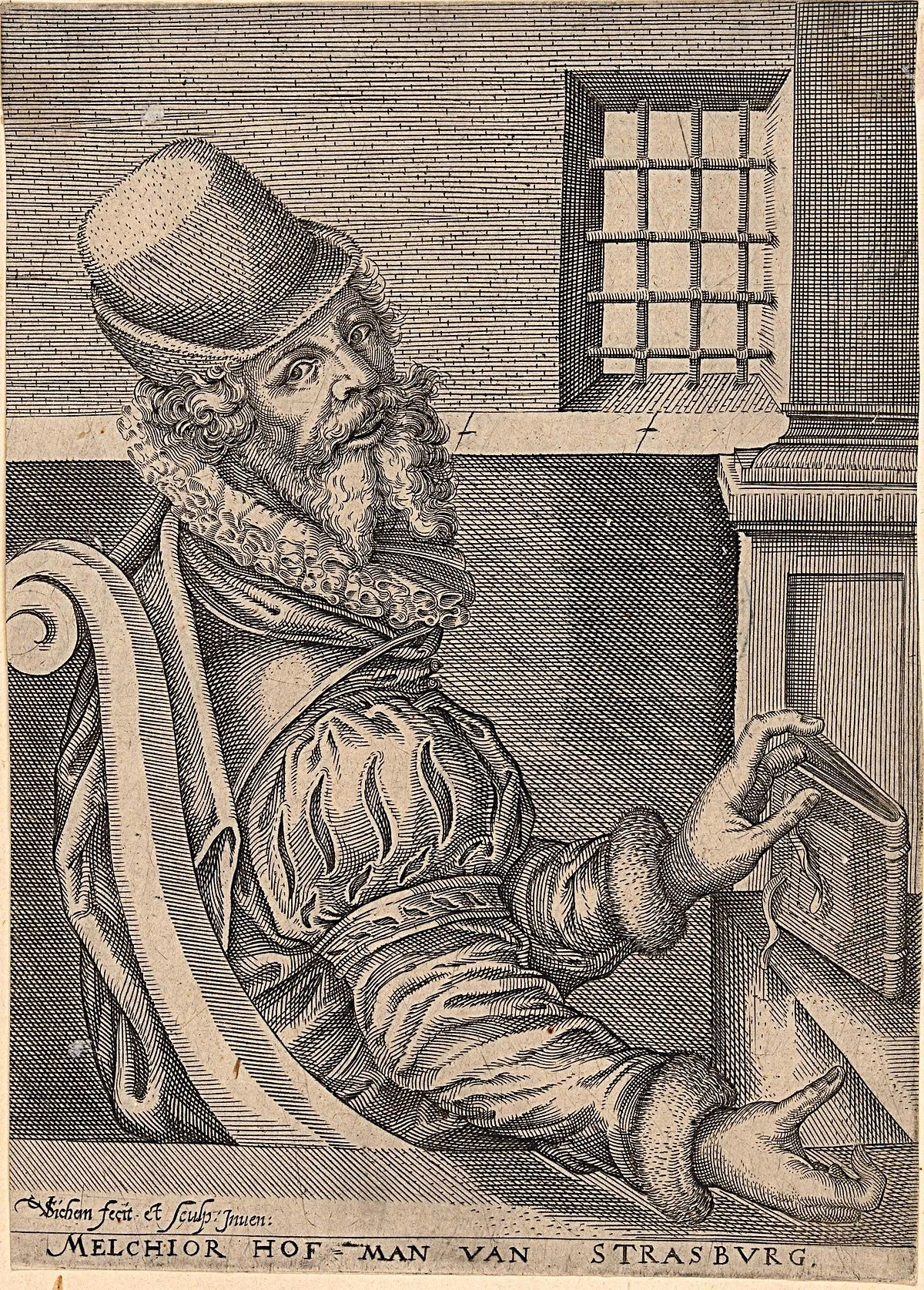
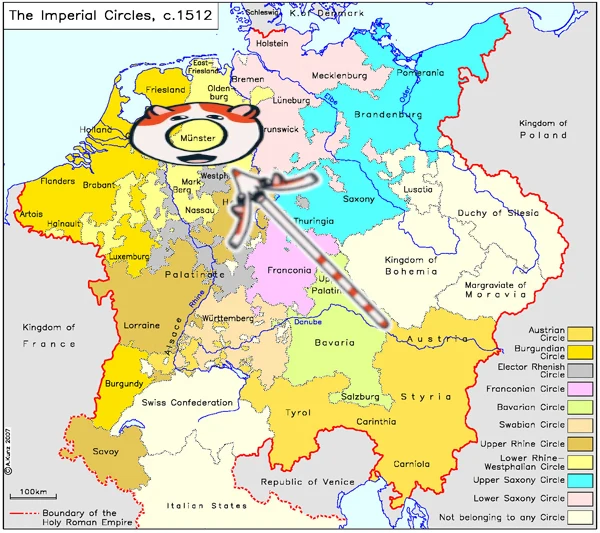
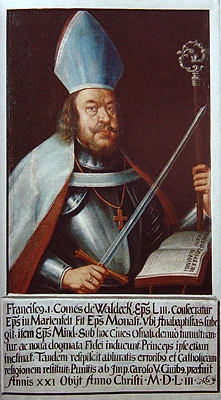
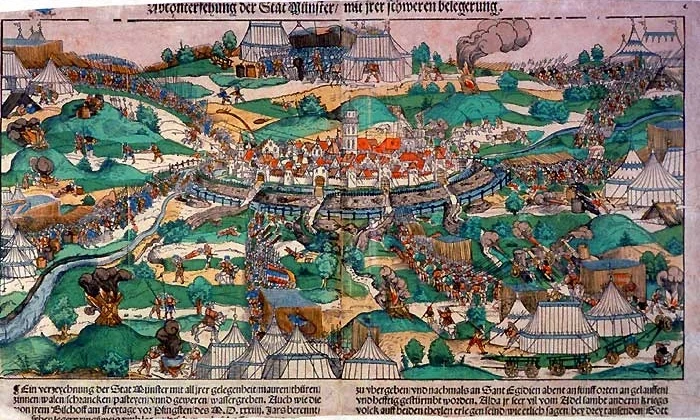
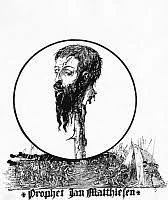

.webp?h=8)

Jump in the discussion.
No email address required.
Heresy in fiction:
By the holy word of the Codex Scriptura Divinum chapter XII a woman is not to be seen speaking, counting, or expressing higher cognitive function in public. You are branded a heretic and will be burnt on a stake for witchcraft as per the ruling of the God-King-Emperor-Priest
Noooooooo! I wish I lived in a more enlightened time! I curse you and your entire bloodline to only give birth to strong females so one day you know my pain!!!!
Heresy IRL:
I smeared shit all over your icons and just finished a naked jog around the city while calling for people to convert
I'm going to fricking kill you
Jump in the discussion.
No email address required.
Erm...
Rothmann was an academic and published several scriptural arguments justifying Anabaptism while Munster was having its episode. He was a credible enough writer that Martin Luther himself felt the need to respond to a few of his papers. It just happened that streaking for Jesus was in line with the sect's more intellectual basis
People tend to focus more on the wild antics many heretics get into (myself included), since its the more exiting part of emergent religious movements, but for every Van Leyden streaking accross a city, there's also a Rothmann writing genuinely well-reasoned arguments.
Jump in the discussion.
No email address required.
More options
Context
More options
Context
good post. didn't think i'd learn something today
Jump in the discussion.
No email address required.
It's a great story. Jan Matthys kind of had this "walkie talkie" relationship with God. They were all at dinner and he was like "what's that you say God? Oh yeah sure!" Then he led this charge and got torn to shreds. Like, a dozen untrained dudes on horses versus 500 heavy cavalry.
His successor, Jan Van Leiden, explained that God really DID tell Matthys to do it, but the reason it didn't work to save the city was because he didn't follow what God said EXACTLY. God told him to do it all by himself, but once he brought more people with him, God said "you don't get to bring friends, big guy" and let the Prince Bishop's knights kill him. If I remember right he got a spear to the face and his brains sloshed out of his head.
The zealots in the town became pog-tier Warcraft 2 peasants with how they could repair holes in the walls. The solution that the Prince Bishop came up with -- to fully lock the siege and to prevent the Anabaptists from sending out more leaflets for reinforcements -- was to build a second wall around the city, leading to starvation.
Van Leiden promised that God would turn the cobblestones to bread for them, and once they got desperate enough to try eating them, they did not transubstantiate.
The story of how the Price Bishop's commando forces infiltrated the city and the ensuing battles are wild stories on their own. The execution was well documented. The cages where they kept their bones are still present in the city.
And that's where the Amish come from.
Jump in the discussion.
No email address required.
At no point in your rambling, incoherent post were you even close to anything that could be considered a rational thought. Everyone on this site is now dumber for having read it. May God have mercy on your soul.
Jump in the discussion.
No email address required.
More options
Context
More options
Context
More options
Context
I recommend playing Josh Sawyer's recent classic Pentiment to put you in the shoes of the people involved.
It's all remarkably similar to the Hussites in Bohemia a century earlier. Everyone is convinced that they just happen to live in the generation when Jesus will return, and it will be on a hill in their backyard.
Jump in the discussion.
No email address required.
More options
Context
Dude absolutely based and keyed I love anabaptist history unironically saved bro
Jump in the discussion.
No email address required.
More options
Context
fake year didn't read
Jump in the discussion.
No email address required.
Darn. And my creative writing club told me this was believable, too
Jump in the discussion.
No email address required.
More options
Context
More options
Context
This is a wild ride. Great effort post.
Jump in the discussion.
No email address required.
The story of Von Wyck is actually kind of a sad one. He was part of multiple efforts to achieve peace while things between the city and the bishop were heating up, and with Philip of Hesse's help, the two sides actually did come to many agreements. It was just that these agreements really only served to delay the inevitable, since neither side was ever interested in a permanent peace.
When negotiations fell through it was actually due to purposeful sabotage on the Anabaptists' part. They deliberately sent a group of lower-class commoners with the negotiating party as an insult to the bishop, and this was essentually why Von Wyck would be imprisoned and executed. I wouldn't go so far as to say that the Anabaptists knew he'd be killed, but they were def knowingly putting him in danger.
The fact that Von Wyck would reportedly become very friendly with the noble who was tasked with keeping an eye on him (AND executing him when the time came) coupled with the execution apparently being very sudden and coming as a surprise to all parties (they were interrupted playing a board game when the bishop's order was delivered), and you got one of the most tragic deaths of this saga.
Jump in the discussion.
No email address required.
Thesis rejected, 0/10, publishing denied, peer review failed, unscibscribed, unfollowed, committed sudoku
Also as always the lawcel did nothing wrong
Jump in the discussion.
No email address required.
My credibility after a small spelling mistake
Jump in the discussion.
No email address required.
More options
Context
More options
Context
You can type 10,000 characters and you decided that these were the one's that you wanted.
Jump in the discussion.
No email address required.
well frick you I thought it was sad
Jump in the discussion.
No email address required.
More options
Context
More options
Context
More options
Context
More options
Context
You are one heck of a good story pitch writer
Id invest in your startup
Jump in the discussion.
No email address required.
More options
Context
How tf do you make a picture the thumbnaill aaaaaaa



Jump in the discussion.
No email address required.
Paste it into url box
Jump in the discussion.
No email address required.
I don't see it, can you add urls after posting?
Jump in the discussion.
No email address required.
No
Jump in the discussion.
No email address required.
Jump in the discussion.
No email address required.
More options
Context
More options
Context
More options
Context
More options
Context
Where's the alt text for the thumbnail?
Jump in the discussion.
No email address required.
More options
Context
Add it to the body first
Jump in the discussion.
No email address required.
More options
Context
More options
Context
If one of anabaptists principles was that people should come to the faith willingly how did they justify to themselves forcing the non protestants in Munster to convert or be exiled with nothing in the winter? A very loose definition of willingly I guess?
Jump in the discussion.
No email address required.
Hypocrisy, in my religious schisms?
Jump in the discussion.
No email address required.
More options
Context
More options
Context
Excellent post. What do non-Catholic historians believe the red sky with three suns was?
Jump in the discussion.
No email address required.
The sources didn't theorize much on that, but my guess is this https://en.wikipedia.org/wiki/Sun_dog
There are many times in history where sun dogs were attributed as heavenly signs of something or another, like when Constantine I (possibly) saw one before the battle of the Milvian bridge, when he converted to christianity https://en.wikipedia.org/wiki/Battle_of_the_Milvian_Bridge
Jump in the discussion.
No email address required.
I did not know those were a thing. Thanks!
Jump in the discussion.
No email address required.
More options
Context
More options
Context
More options
Context
Somebody's a Dan Carlin fan!
Nice write up
Jump in the discussion.
No email address required.
Whos Dan Carlin
Jump in the discussion.
No email address required.
He's a history podcaster (longest running, so everything else is derivative) who releases audiobook length radio shows on a completely irregular basis with a cult following. He did a show a while back on this exact topic called Prophets of Doom. It was fantastic, highly recommend that episode specifically and his show generally
Jump in the discussion.
No email address required.
All of his podcasts are great. He's a fantastic storyteller
Jump in the discussion.
No email address required.
More options
Context
Just want to pile on more praise/tell others how great this podcast is:
Carlin has been doing multi-part audiobook-length series for a while now, which cover one specific historical event/period (the series on the Roman Republic, the Mongols, and WWI are my favorites), but sometimes does one-off episodes. Prophets of Doom is one of those one-offs. It is easily my favorite Hardcore History episode, in fact it's so fricking good that I listen to it at least once a year. It is an absolute trip. Dan's style of storytelling is so compelling, and the absurdity of this historical event really draws out the genius of his podcasting style (even though he is only drawing from a handful of sources due to him not being able to read the countless german-only sources).
I have the entire Hardcore History back-catalogue (yes, I paid for it, I love Dan & his work so I gladly became a paypig), but if anyone is curious about a specific past series that is now paywalled, I would be glad to share it
Jump in the discussion.
No email address required.
More options
Context
More options
Context
More options
Context
More options
Context
What authority did bishops have to execute people? He seems to do that on a whim. Wouldn't that be the job of the feudal lord?
Jump in the discussion.
No email address required.
The Bishop was the feudal lord. Munster was what was known as a prince-bishopric, where the land was owned by the church and ruled by a church-appointed official.
Jump in the discussion.
No email address required.
These were inherited, right? Not appointed by the pope or emperor?
Jump in the discussion.
No email address required.
No, they were appointed. There were times in which bishoprics could be "captured" by a particular family (many of the Archbishops of Cologne were of the Wittelsbach family of Bavaria), but they weren't hereditary and a candidate was not required to be a noble.
Asking that question anytime post-emperor Otto would be a sure fire way to get everyone in the room to try to kill each other. It really depends on the time your asking about whether the church or secular powers had more influence over church appointment. The issue was called "Investiture" and there were tons of conflicts over it.
Jump in the discussion.
No email address required.
Yeah I can never keep track of that. Can't even remember if one side ever won in the end.
Jump in the discussion.
No email address required.
I don't know the exact details of who scored more victories, but I think the conflict kind of just died down when the reformation picked up or maybe even a little before. I do know that in Italy (where the conflict was most active) it was the Pope that came on top in the end, but even that was a short victory. By the time the imperial faction was defeated, the urban centers were growing in power and soon after, neither the feudal lords of Italy nor the church could be well said to "control" the area
Jump in the discussion.
No email address required.
More options
Context
More options
Context
More options
Context
More options
Context
More options
Context
More options
Context
If you want a 5 hour version of this, just listen to “Prophets of Doom” by Dan Carlin.
Jump in the discussion.
No email address required.
Aghhhh who is this Dan Carlin guy and why is he retroactively stealing my ideas
Jump in the discussion.
No email address required.
You should really listen to the podcast, honestly I thought that you just got "inspired" by his episode on this
He does it justice, and his style of storytelling seriously lends itself to the tale.
It's so old that the episode is paywalled, but if you can't find it somewhere online, I will try to share it
Jump in the discussion.
No email address required.
More options
Context
More options
Context
More options
Context
Great post, genuinely unfamiliar with any of that. This is the kind of crazy behavior that makes me skeptical when people take modernity for granted
Jump in the discussion.
No email address required.
More options
Context
Jump in the discussion.
No email address required.
More options
Context
Are they though?
Jump in the discussion.
No email address required.
More options
Context
Hardcore History did a great show on this -- "Prophets of Doom"
He's charging money for it now on his site
but you can find his back catalog on TPB
Jump in the discussion.
No email address required.
More options
Context
Oh well, time to get shit faced in Münster and running around naked again
Jump in the discussion.
No email address required.
More options
Context